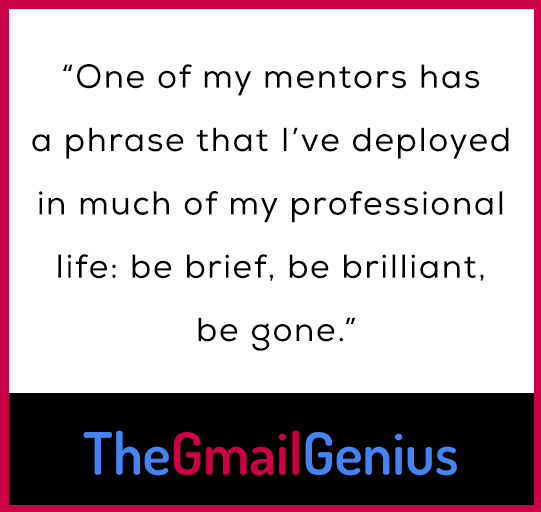How I Email: Felicia C. Sullivan, Executive Brand Strategist & Marketing Consultant
Email is a non-negotiable part of everyday life. For some, it’s an unruly time suck, but enlightened email users have systems to ensure they’re not a slave to the inbox. We’re asking smart thinkers to give us a peek inside their inboxes, share tips, ideas, gripes, and everything in between.
Felicia C. Sullivan is a digital marketer and published author. Over the past decade, she has worked with more than 60 global brands in beauty, fashion, luxury, retail, CPG, and pharma. A popular Medium writer, she graciously shared her thoughts on writing better business emails.
 How do you manage your inbox day-to-day?
How do you manage your inbox day-to-day?
In all things professional and personal, I’m a believer in the philosophical principle of Occam’s Razor—the simplest solution is often the best one. We overcomplicate everything—especially our inbox. I’ve lost count of how many articles people write about the tsunami, deluge, mountain that is their inbox, assigning weight to communication that can be easily managed with the right process and a dose of deep breathing. My process is simple. I check email three times a day, and I perform one of three actions on each email: discard, delete, or delegate. Not every email requires a response or an immediate one. Emails that require a more thoughtful response are delegated to a folder where they are marked for follow-up.
Also, take a snapshot of the contents in your inbox? Are you being bombarded by things you don’t really need? I subscribe to four newsletters. That’s it. No news alerts. No sale alerts. No retail alerts. I don’t invite temptation into my space and this is what a lot of these messages are—seduction ploys targeting our attention, energy, and wallet. I don’t give out my email to anyone—retailers, websites, etc. I only get information about that which I need. Everything else is noise.
When it comes to business emails, what 1-2 things could help people level up?
Here’s a hard, necessary truth that most businesses ignore—people care more about them than they do about you. Brands are so focused on storytelling and seduction tactics that they forget the simple fact that people want their problems solved and needs addressed. Tell all the stories you want—if your reader doesn’t find a benefit in the form of entertainment, education, value, utility or reciprocity, they won’t care.
We understand others not by thinking, but by feeling. We feel first, think second. Scientifically, we home in on “mirror neurons”—creating words that simulate your customers’ actions, and the thoughts and feelings behind their actions. They feel like you’re talking to them, about them.
Know your customer. Do your research. Talk to them. Understand their buying behaviors, triggers, habits, motivations, pain points and influences. Get in their head and set up shop. And talk to them from a place of understanding what they need and how you’ll satisfy it.
One of my mentors has a phrase that I’ve deployed in much of my professional life: be brief, be brilliant, be gone. Capture their attention. Tell them something they didn’t know. Be focused on the one takeaway and write as plainly and succintly as possible.
 You wrote that adding someone to your email list without their permission is “the equivalent of dragging your friend out of bed in their underwear and strapping them in for a cross-country road trip.” Why do you think so many people just can’t resist the temptation?
You wrote that adding someone to your email list without their permission is “the equivalent of dragging your friend out of bed in their underwear and strapping them in for a cross-country road trip.” Why do you think so many people just can’t resist the temptation?
Two reasons:
1) I think we live in a “cult of more” where we place value on vanity metrics like fans, followers, and subscribers. If we have more, we must be successful, right? I’ve seen people who have tens of thousands of subscribers with abyssmal open and click rates. You may have amassed a lot of people, but are they really valuable? Are they reading, engaging, converting? Or do they just file your email to their spam folder and unsubscribe—thus increasing the likelihood of email blacklisting? The size of one’s list is irrelevant—it’s the quality of the people, and their desire to hear from you, that matters. We live in the era of GDPR and increasing privacy laws, so there could actual be real repurcussions if you add someone to your email list without their expressed permission.
2) Part of me thinks that people believe that if someone follows you on social media or has interacted with you in some way won’t mind being added to an email list. People do mind. An email is an invitation into someone’s inbox and their attention. Most people are selective about the lists in which they subscribe, and they do so because they want to cultivate a deeper relationship (leading to purchase intent) with a business of their choosing. You can’t just elbow your way in and demand someone’s attention when you haven’t earned it. Just because I read someone’s essays on Medium or follow them on LinkedIn doesn’t meant I want them hocking their wares in my inbox.
Speaking of email lists, which ones do you especially like being on?
- Austin Kleon
- Ann Helen Peterson’s newsletter
- Nisha Chittal’s newsletter [ed note: Nisha is a friend of The Gmail Genius]
- My friend Jenna Britton’s newsletter
There are some excellent ones to check out in this Vanity Fair article.